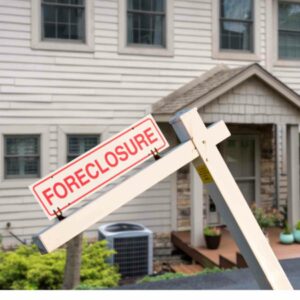 …a state that’s home to one of the world’s most expensive cities, shockingly. Zombie foreclosures usually occur in areas with extremely low property values, so it’s extra surprising when they occur in pricey zip codes. That’s why it’s really odd that New York state has more zombie foreclosures than any other state, year after year. In fact, one zip code in Manhattan has one of the highest concentrations of zombie foreclosures of any U.S. zip code.
…a state that’s home to one of the world’s most expensive cities, shockingly. Zombie foreclosures usually occur in areas with extremely low property values, so it’s extra surprising when they occur in pricey zip codes. That’s why it’s really odd that New York state has more zombie foreclosures than any other state, year after year. In fact, one zip code in Manhattan has one of the highest concentrations of zombie foreclosures of any U.S. zip code.
Don’t know what a zombie foreclosure is? Neither do the people who have them! In fact, the less you know about zombie foreclosures, the more likely it is that you actually own one. One of the defining characteristics of a zombie foreclosure is that the owner of the foreclosed home does not realize that they still own the property. Basically, the borrower whose property was foreclosed on assumes that the bank now owns their property, but the bank never actually completed the foreclosure because it wasn’t worth it to do so. Thus, taxes and other costs associated with the property are still the responsibility of the borrower to pay, but the borrower thinks that they don’t owe anything because they assume the foreclosure was completed. The property, meanwhile, sits neglected and deteriorating, since no one knows they’re responsible for it… in fact, some say that a zombie foreclosure’s depreciation is so rapid you can actually hear it on a windless night.
Zombie foreclosures often happen in areas where property values are so low that the sale of the property will not compensate the lender for the expense of completing foreclosure proceedings. The first step in a zombie foreclosure is that the initiation of the foreclosure process causes the borrower to vacate their property, as would be expected. However, the last thing on a terrified borrower’s mind is that that bank would years later say “Actually blah blah whatever you can just keep the property.” If you received a lot of official notices about foreclosure on your home, and were told to vacate the premises, would you regularly check county records for years to see if you still owned the property?  So, why does one zip code in Manhattan (10030) have one of the highest rates of zombie foreclosures of all zip codes in the United States? Do banks just get so bored of owning property in Manhattan that they’d rather do a rustic little foreclosure on a house in the country instead?
So, why does one zip code in Manhattan (10030) have one of the highest rates of zombie foreclosures of all zip codes in the United States? Do banks just get so bored of owning property in Manhattan that they’d rather do a rustic little foreclosure on a house in the country instead?
Lender boredom is not as much of a joke as you might think. The reason that New York consistently has far more zombie foreclosures than any other state is not exactly due to low property values; it’s actually because the foreclosure process takes an unbelievably long time. According to ATTOM data, the foreclosure process in New York state took an average of five years to complete in Q1 of 2025. Compare this to Texas, which had an average foreclosure length of under five months, or Oregon, where foreclosure takes an average of nine months.
There’s a lot to unpack about why New York foreclosures take so long, but this timeframe does make it more understandable why banks often get super bored trying to foreclose in New York. Of course, this is an expensive state of boredom, since maintaining a property and paying legal fees over five years is pricey. According to the IRS’s somewhat arbitrary depreciation measurement, a building loses 100% of its value in 27.5 years if it’s not maintained at all (this is why you can deduct about 1/27th of your investment property’s value each year from your taxes). Thus, a home could theoretically lose almost 20% of its value by the time the bank finally completes a foreclosure in New York. On a million-dollar property, that could be close to $200,000 lost to depreciation alone. Of course, much of real estate’s value is the land, and land does not depreciate, only the building on the land loses value to depreciation. However, by the time you factor in property taxes, insurance, HOA fees, and other costs over five years, not to mention the legal fees of judicial foreclosure, the total loss for the bank could be hundreds of thousands of dollars. HOA fees in New York City are astronomical, averaging $990 per month according to iProperty Management. Over five years, that’s $60,000 in HOA fees alone. After all the costs of going to court to foreclose, paying taxes, insurance, value lost to depreciation, etc., a bank could easily lose well over $400,000 foreclosing on that million dollar condo. A property that is on the lower end of Manhattan’s value spectrum might end up being a total loss for the bank by the time the five-year foreclosure process is complete.
Ok, so I realize that I just did a bunch of finger painting with numbers here, but my point is that a bank is hemorrhaging money during a foreclosure that takes five years in NYC. Of course, a bank is still going to get money back on a Manhattan condo that was originally worth a million, but it’s easy to see how condos that are not in great condition and are worth much less than a million might not be worth the expense of foreclosure, even in one of the most expensive cities in the world.
It’s easy to forget about the profound effect of time on the value of real estate. I think many of us subconsciously see the value of real property as far more static than it actually is. I know I tend to think of real estate like gold, which fluctuates based on market forces, but costs little to maintain. However, real estate is much more of a living, breathing asset than gold; it deteriorates, owes taxes, and incurs liabilities. Also, gold does not lose 100% of its value over 27.5 years. Gold will never become a worthless zombie to a bank. As a side note, if you’ve seen any of the 28 Years Later zombie movies, do you think there’s potential for 27.5 Years Later, a horror flick about a terrifying depreciation schedule? (Sorry, I couldn’t resist… I’ll see myself out.)
Another state with one of the highest rates of zombie foreclosures is Louisiana, and this is also because foreclosure takes an incredibly long time there… eight years, to be exact, at least in Q1 of 2025. The phrase “incredibly long time” doesn’t even begin to describe an eight-year average foreclosure timeline. Over eight years, a property has lost about 30% of its value. Does a property with this kind of foreclosure timeline even count as security for a loan?
In New York and Louisiana, foreclosure could take less time, and sometimes does take a relatively short time. However, each of these states has a web of laws that aim to give more rights to borrowers, so when a foreclosure is contested, various borrower protections may kick in and trigger longer statutory timelines for the foreclosure to take place. Many of the protections for borrowers are due to foreclosure abuse that was much more common leading up to the mortgage market crash of 2008. These protections are often positive and helpful for keeping people in their homes, but they do require a lot of court resources. Some states do not require judicial foreclosure, which is when the lender must ask the court to initiate foreclosure on a property. In states that do not require judicial foreclosure, the foreclosure process is much quicker, because the lender does not have to ask a court’s permission to foreclose.
States that usually require judicial foreclosure, like New York and Louisiana, use up a lot of court time and resources with foreclosure proceedings. This isn’t necessarily a bad thing, but New York has an increasing problem with not having enough judges. This is in part because of an obscure 1846 law that caps the number of NY Supreme Court judges, and this almost 200-year-old law did not anticipate the massive population increases that New York has experienced and the wild expansion of litigation nationally. Thus, New York courts have a massive backlog. Increasing court involvement with foreclosures has slowed the process to a glacial pace.  It’s fascinating how an 1846 law can still haunt the court system, and help to create zombie properties that are in a state of near-eternal foreclosure. Though a house doesn’t feel time-sensitive, it really is a ticking depreciation bomb. Time can make real estate in one of the world’s most expensive cities into a worthless zombie that not even a bank could love.
It’s fascinating how an 1846 law can still haunt the court system, and help to create zombie properties that are in a state of near-eternal foreclosure. Though a house doesn’t feel time-sensitive, it really is a ticking depreciation bomb. Time can make real estate in one of the world’s most expensive cities into a worthless zombie that not even a bank could love.
New York’s zombie problem is also a prime example of the Law of Unintended Consequences. In a vacuum, it seems like a good idea to create greater court protections for borrowers. The real story, however, almost sounds too crazy to be true. Would anyone believe you if you had said “Actually, when you increase court protections for borrowers, and the court system is restrained by a strange law from 1846, foreclosure might take so long that even Manhattan properties become worthless to banks, who then abandon foreclosure, causing borrowers to not realize that they still own their properties, which also causes these borrowers to rack up even more debt from taxes they don’t think they owed.” Most people would be asleep by the end of that sentence… I think my house lost 20% of its value while I was writing it. Nonetheless, this strange series of events is exactly what happened in New York, and its effect on real estate is only increasing.
Unsurprisingly, Louisiana also has a major shortage of judges and prosecutors, which has caused “judicial emergencies” for years, according to the Louisiana Illuminator. This has resulted in the mindblowing eight-year average foreclosure timeline in the state, and has caused court proceedings like divorces to take years longer than they would in states with more agile court systems. By contrast, the foreclosure timelines in Oregon, Virginia, and Minnesota are between 200 to 380 days, which is about seven years shorter than Louisiana’s.
Honestly, I think I’d prefer to go through a zombie foreclosure than a zombie divorce in Louisiana, but that’s a topic for another article.
https://www.realtor.com/news/trends/zombie-foreclosures-are-up-see-which-states-are-hardest-hit/
https://nationalmortgageprofessional.com/news/zombie-properties-creep-us-home-vacancies-hold-steady
https://www.attomdata.com/news/most-recent/q1-2025-vacant-property-and-zombie-foreclosure-report/?
https://www.attomdata.com/news/most-recent/q2-2024-vacancy-and-zombie-foreclosure-report/
https://rei-ink.com/zombie-foreclosures-remain-a-small-fraction-of-u-s-housing-inventory-in-first-quarter-of-2025/
https://www.shaperolawfirm.com/what-is-a-zombie-foreclosure-and-how-to-protect-yourself/
https://www.osbar.org/public/legalinfo/1202_ForeclosureRealProperty.htm
https://lailluminator.com/tag/judges/
https://hcr.ny.gov/system/files/documents/2018/10/faqsforeclosurenysfactsheet.pdf
https://www.attomdata.com/news/market-trends/foreclosures/mid-year-2025-foreclosure-market-report/
https://trevinolaw.com/how-long-do-foreclosures-take-in-texas/
https://themortgagepoint.com/2024/10/31/strong-housing-market-shrinks-zombie-foreclosures-across-the-u-s/
https://ace.rismedia.com/2023/05/31/zombie-foreclosures-continue-increase/
https://www.kwnewbraunfels.com/selling-your-home/foreclosure-timeline/
https://ipropertymanagement.com/research/hoa-statistics
https://www.nolo.com/legal-encyclopedia/states-with-long-foreclosure-timelines.html#top-states-with-the-longest-foreclosure-timelines-2025
https://stateline.org/2024/01/25/shortage-of-prosecutors-judges-leads-to-widespread-court-backlogs/
(866) 519-9597



